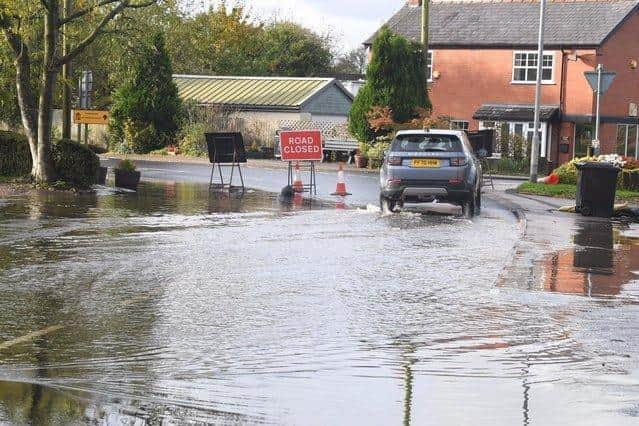Plans to help prevent flooding in South Ribble and Ribble Valley
and live on Freeview channel 276
Nine of the projects – worth a total of £1.7m – have received regional approval from the relevant agencies, which is expected to result in them getting the national go ahead from the Department for Environment, Food and Rural Affairs (DEFRA). A tenth, smaller scheme - also for Wyre - is the subject of a bid to a North West-based fund.
The decisions are due shortly and, when they come, further design work will be done to more fully develop each of the plans. Some of the projects are designed to rectify existing problems, while others will take the form of studies to determine what action is needed.


Advertisement
Hide AdAdvertisement
Hide AdIn South Ribble, a £150,000 scheme in Lostock Hall will seek to improve surface water drainage - and understand the current issues with it - on Prospect Avenue between the railway lines and Brownedge Road.
Meanwhile, in Ribble Valley, £242,000 has been earmarked for studies to compile a surface water management plan for Longridge and Barrow, which will include public engagement with the two communities.
Separately in the borough, improvements are planned to Wiswell Brook, which are also designed to improve surface water issues, this time in Whalley.
Lancashire County Council’s cabinet member for environment and climate change Shaun Turner told a recent cabinet meeting that he hoped the identified schemes would make Lancashire “more resilient to flooding”.


Advertisement
Hide AdAdvertisement
Hide AdHe also stressed the potential complexity of the works, the most demanding of which could stretch out to 2027.
“It’s not just about turning up and putting a drain in and hoping that [it] will do the job. There is a lot of investigation [that] goes into making these schemes credible - and that is the only way you can be successful [in bidding for funding],” he explained.
Members agreed to accept the expected grant into County Hall’s capital programme - and also for the authority to provide an unspecified amount in “partnership contributions” towards the cost of the projects. This match funding will not necessarily be in cash, but could come in the form of a commitment to maintain any new infrastructure, as well as to donate staff time.
The meeting heard that the county council will attempt to develop those flood alleviation projects that do not involve the creation of new assets, which would put a maintenance burden on the authority in future years. Where that is unavoidable, however, the installation of any new infrastructure will be subject to further approval within the council as and when the schemes are developed.
Advertisement
Hide AdAdvertisement
Hide AdCabinet member for highways and transport Charlie Edwards said that it was also important for those who own watercourses to be made aware of their flood prevention responsibilities. Anybody who has a body of water running on or under their land - or along its border - is generally regarded as a “riparian owner”.
That means they are obliged to allow water to flow naturally, to take action to report and, if necessary, remove any blockages and to alert the authorities to any flooding which does occur.
“We do need to make sure we educate our residents and those [who] are riparian owners…so that they understand the…responsibilities they have and the impact their actions or inactions [may] have on flooding,” County Cllr Edwards said.
Watercourses covered by riparian ownership include rivers, streams, brooks and culverts.
Advertisement
Hide AdAdvertisement
Hide AdAlthough the county council is the lead local flood authority for Lancashire, County Cllr Turner said that flood prevention was not solely County Hall’s responsibility “by a long shot”. He urged residents to visit the “Flood Hub” website in order to learn what they could do to help prevent flooding in their area.
LANCASHIRE’S PROPOSED FLOOD SCHEMES
LANCASTER
Carnforth, Kellet Road culvert – optioneering and design for highway culvert upsizing – £100,000
Torrisholme and Bare surface water surface management plan – using the extensive surveys made by Flood Risk Management & Highways teams during 2021 to identify best value locations for improvement schemes – £25,000
PENDLE
Brierfield level 2 surface water management plan – study with community engagement £148,500
RIBBLE VALLEY
Advertisement
Hide AdAdvertisement
Hide AdWhalley surface water improvement scheme – Wiswell Brook improvements – £220,000
Longridge and Barrow level 2 surface water management plan – studies, with community engagement – £242,000
SOUTH RIBBLE
Prospect Avenue, Lostock Hall – to understand and improve surface water drainage between the railway lines and Brownedge Road – £150,000
WEST LANCASHIRE
Parbold Village options appraisal and scheme delivery – to complete work already initiated by Lancashire County Council after December 2015 floods – £200,000
WYRE
Advertisement
Hide AdAdvertisement
Hide AdThornton-Cleveleys level 3 surface water management – combining previous studies by the Environment Agency and United Utilities with information from November 2017 flooding and more recent and localised events, to identify
options for sustainable surface water management – £600,000
Pilling catchment study – to identify sustainable options for managing complex
surface water flooding – £40,000
Preesall emergency traffic management – required for highways’ community project – £30,000 (from Regional Flood and Coastal Committee local levy)
Want to see fewer ads? Subscribers to the Lancashire Post get access to the ad-lite version of our website, which features 70% fewer ads and faster load times for a better experience. Find out more here.
Comment Guidelines
National World encourages reader discussion on our stories. User feedback, insights and back-and-forth exchanges add a rich layer of context to reporting. Please review our Community Guidelines before commenting.
